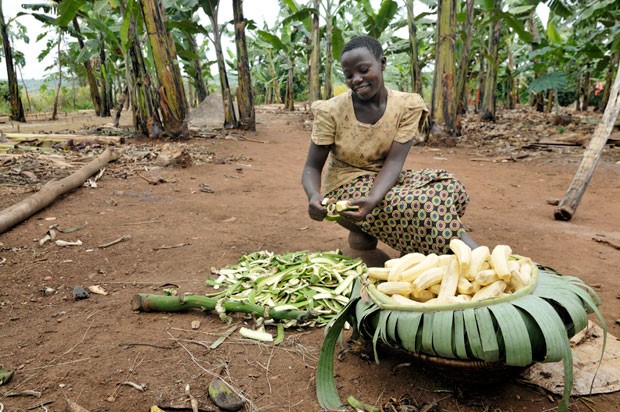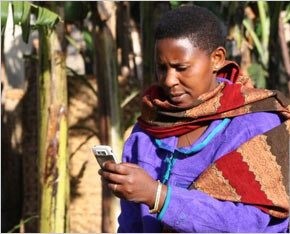By Joshua Machinga

Elizabeth Namaswa – CGA’s green banana farming project, Kitale, Kenya
Kitale, Kenya: Last year Elizabeth Namaswa received a small-business loan of $200 from one of Village Volunteers’ alumni volunteers, which she invested in the green banana farming project in her village near Kitale. This project, started by Common Ground for Africa (CGA), is helping develop a strong banana farming sector in and around Kitale by working with women farmers like Elizabeth to improve their productivity, business skills, and market connections. Green cooking-bananas are increasingly becoming one of Kenya’s food staples, accounting for nearly one-fifth of the country’s caloric intake. But despite strong demand, many smallholder banana farmers are struggling to earn a sustainable income. To address this, CGA is teaching farmers the best practices for banana planting and are encouraging them to join groups of other producers to sell their crops collectively. We are also helping the women diversify into the dairy sector, as farm animals are fed banana leaves and stalk to improve their resilience.
All this has been made possible through the SiSi Fund (short for Sister-to-Sister), a micro-financing fund setup through Village Volunteers that empowers women (particularly widows) with financial, administrative, agricultural and healthcare support, all free of charge, so they can become self-reliant through successful businesses. For the green banana farming project, resources from the SiSi Fund have helped farmers earn nearly 1 million Kenyan Shillings (roughly $10,000) from sales over the last 12 months, providing reliable income while improving food security in the region.
The SiSi Fund especially supports lending to widowed women who continue to be one of the most marginalized groups in Kenya, largely due to pervasive paternalistic practices and cultural attitudes. In rural Kenya, the girl child is at a disadvantage from the day she is born, and her disadvantage persists well into adulthood. Access to credit from formal lending institutions is one of the critical areas where women face obstacles – In Kenya, access to loans requires collateral, which is often land. Traditionally, a widowed woman does not inherit her husband’s land; the house and all the deceased’s possessions are often ‘returned’ to his brothers and other family members, leaving the widow no collateral to show the bank that she is deserving of credit. With no credit, house, land or possessions, and often with no or minimal formal education, women struggle with the impossible burden of paying school and medical fees, in addition to feeding their children. This is where informal micro-financing becomes a powerful tool through which outliers can find financial support, logistical guidance, and success in setting-up a vibrant business.
Elizabeth Namaswa is one such SiSi Fund success story. While her initial loans covered farming expenses, though subsequent loans and guidance Elizabeth sought value addition in the green banana business and involved her daughter to try and sell banana crisps in the village. Sales of the crisps increased threefold in the first year, and the family now earns 30,000 Kenyan Shillings (roughly $300) a month, more than many primary school teachers in Kenya. Elizabeth has also traveled to Kisii through CGA to learn more about banana processing. She has since repaid the initial loan and plans to apply for another so that she may expand her business by employing more people.

Joyce Areba applying for her first loan of $200 from SiSi Fund via SMS
Sisi Fund’s mobile money services
Since 2014, 560 rural women in western Kenya practicing farming and running small business enterprises are being paid for their farm produce and products through SiSi Fund’s smart money platform. Eighteen women’s groups in Kiminini, Mbao, Nakwangwa, Toll Baraton, Mbai and Mitoto villages are using SMS’s (short mail services) for financial transactions, therefore avoiding thefts that were prevalent when cash was paid directly to clients and members of individual groups. The women in these groups have been able to save and borrow money, repay loans, make purchases and receive payments simply by texting. Each message contains their name, group code number, transaction type, amount and unique PIN number. As the process takes only a few minutes to transact between the Fund and the member, it eliminates the need to haggle with middle men that might make working with money more difficult. The mobile platform also includes a rural advisory network of extension workers. In addition to serving women, the project also serves other members of the community who want to transfer or receive money from their friends and relatives.
Through the SiSi Fund, lives are being transformed, basic needs met and dignity restored. Learn more about how you apply your business and marketing skills by volunteering with one of our partner programs by CLICKING HERE. Apply now!
To support a small business in Kenya through the SiSi Fund, visit www.villagevolunteers.org/donate, select ‘Common Ground For Africa’ in the drop down menu and mention ‘SiSi Fund’ in your memo. Thank you!
Joshua Machinga is the Founder and Director of Common Ground for Africa (CGA) in Kitale, Kenya, a community-led organization with a mission to alleviate poverty while also conserving the Earth’s natural resources and biodiversity. CGA strives to demonstrate, in a concrete, observable way, that modern human societies can live sustainably and comfortably with nature. Their projects include training local farmers in sustainable agricultural practices, providing micro loans and training to women (especially widows) through the SiSi (Sister to Sister) microfinancing fund, conducting youth-led public health awareness workshops around issues such as HIV/AIDS and sanitation, offering educational opportunities to nearly 500 children (often orphaned and vulnerable children) through the Pathfinder Primary School, and providing vocational and entrepreneurial training to young women through the Lenana Girls High School, where each student recently received funding to start small enterprises.
Joshua, thank you for sharing this with us and the Village Volunteers community!
